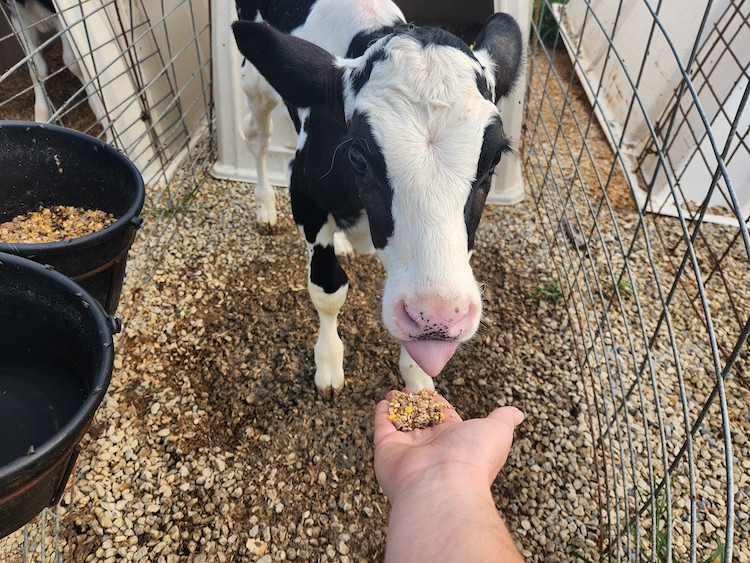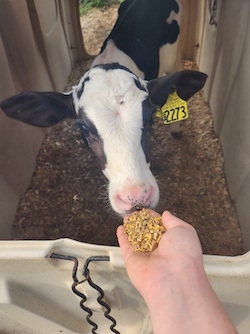
What’s the best calf starter? Of course, the answer is whatever starter fits your operation.
Shortly after I moved back to our farm, we reevaluated the starter we were using. I think it’s a task that should be done regularly, although ours was a decision that originated because the manufacturing abilities changed at the place where we were getting our feed made.
We began our starter evaluation and comparison by considering what was important to us. Because we are a relatively small operation, it was important that we could get the starter made at an affordable rate and at a bulk size that we could get through while it was still fresh.
We use starter only in the first three months of life before we switch to a ground corn-based grain mix. For that reason, we emphasize palatability and protein levels. We want a starter that is attractive to the youngest calves and encourages intake early in life.
Starter selection matters

According to Penn State’s Cassie Yost, there is still no “best” calf starter.
“There are so many other factors that come into play when discussing calf starters, including forages being fed, what type of bedding calves are housed on, how soon calf starter is offered, how much calf starter is being fed, and more,” she commented in a Penn State extension article. “While the type and characteristics of a calf starter are essential, the management practices of the calf program are just as crucial in determining how calves grow and develop.”
That being said, rumen development is driven by fermentation of starch in the rumen from the calf grain or starter fed.
“Rumen development is essential for that calf to be able to handle the nutritional changes as she moves from a liquid diet to a diet of all solid feeds and subsequent forage diets,” Yost explained.
For those evaluating the calf starter on their operation, she suggests considering three things.
First is grain processing and the presence of fines. She explained that if the particle size in a starter is too fine, calves will struggle to consume that starter well. Research has found that starters that are too fine reduce intake and average daily gain of the animals.
Secondly, consider the addition of supplemental forages.
“One reason for supplementing forages is to provide calves eating a finely ground starter with additional roughage to prevent ruminal acidosis,” she shared. “The physical form of starter feed influences rumen fermentation and pH.”
The third consideration is the environment that starter is being asked to nourish calves in.
“There are other factors that help determine which is the most ideal calf starter to feed: feed presentation, eating habits, storage, and economics,” Yost concluded. “Ultimately, the health and performance of your calves are the most important factors that should determine which starter to feed.”
I hope these ideas give you a place to start as you consider if your calf starter is meeting the needs of your calves and your farm.

The author is a dairy farmer in Kansas and a former associate editor at Hoard’s Dairyman. Raised on a 150-cow dairy near Valley Center, Kansas, Maggie graduated from Kansas State University with degrees in agricultural communications and animal sciences.